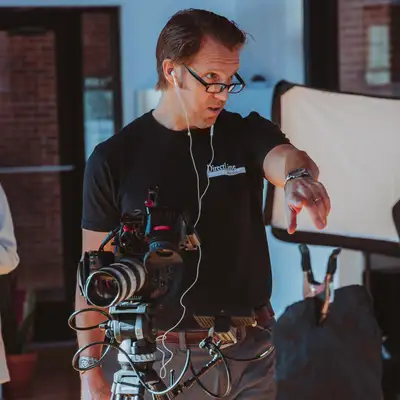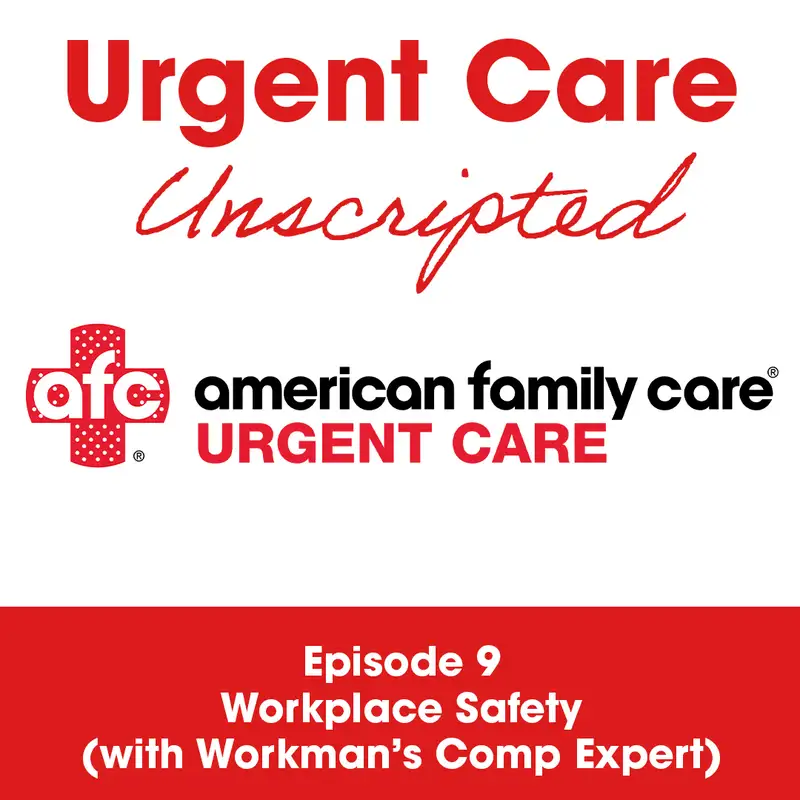Urgent Care Unscripted: Ep. 9 - Workplace Safety (w/ Workman’s Comp Expert)
Hi, everyone, and welcome back
to Urgent Care Unscripted.
My name is Barbara Alter.
I am the Director of operations
and business
development for AFC
Urgent Care in West Haven.
And this is Mohammad Salon and
the franchisee and owner of the is here.
The game is great. And
today we are here to, discuss workplace
safety and occupational health services,
something that impacts everyone.
So it is no matter the size of industry
or where you work.
You are in it and we are going to talk
a little more detail about it.
Yeah.
This is a topic that I think
goes under the radar for most people.
And they don't think about,
occupational health when it comes to an
urgent care.
But it's very important
and it can definitely make a difference
for your business
and for yourself as an employee as well.
And I'm Felix Pacheco, happy to be here,
medical director
for the AFC West saving urgent care.
And we are very happy to have Felix here.
His, veteran, your physician at the,
and he is the leader of our clinical team
at West Haven.
So now we go.
Yeah, let's start with the topic.
What is it
that we can actually do for employers
at an urgent care?
Every employee
wants to ensure the health
and safety of their employees.
So, if there, you know, injuries happen,
then we're occasional falls.
If you work with machinery, and,
when these accidents happen,
they need, usually you,
is it safe for them to return to work?
Is there any significant injury
to the individual?
So in those cases, you need an evaluation,
and we can provide
that sort of medical evaluation.
Yeah.
And in what doctor said if
what of the keyword in there is accident
that can happen any time.
And according
responding to that keyword. Yes.
Yes. Interest haven is open
seven days a week.
You can walk in any time.
You can even
consider and consult with us before
you have to go to an emergency room.
And we can advise what the next step
would be to.
Yeah, absolutely.
One other things that we also do
at the urging care
for a lot of the employers is a dot
physicals.
That's a big one.
And we can also do employment physicals,
drug screenings.
So those are all boxes that we can check
as your partner in this,
you know, employer world.
There's also a key, level of access
when you have an urgent care
that you're working
with directly because, you know,
you're going to get your results on time,
you know, that you can get your patients
in and out as quickly as possible,
since you are typically you're paying
for that employer's time.
So if you have a relationship
with your local urgent care,
I think it's it's a big, big help
and a big, big difference
for your, for your business for sure.
And those, again, to, to that keyword
of when the accident happens.
You want to be prepared for that.
And as long as you have that relationship
with the urgent care
or the local, clinic,
what comes with that relationship?
If we can get some more information
about the profile of your industry
or the profile of your workforce,
or the job descriptions up of your staff,
then we can be better prepared to serve
your needs when that accident happens
and know about what kind of injury.
And, I'll be, in a more educated manner.
Yeah.
My initial response,
I was focusing on the, current employee.
Employee. But,
she mentioned
the good points from, like,
the pre-employment process
and how screenings
are typically involved there.
But then there's also continuous
screenings for certain positions, like,
you know, D.O.T.
physicals and,
you know, truck drivers and such.
You know,
so we do all that if you think about,
the things that are required
for a lot of weeks and in general,
pre-employment
physical and, minor injuries,
pretty much include that as well.
Yeah.
I feel like,
can you touch base on a little bit
as from a provider's perspective,
what that importance is in your eyes
to have a relationship with an urgent care
when it comes to getting your employment,
you know, even getting back to work,
like, as far as restrictions,
I know that sometimes that's tough for
for you guys as providers
to determine whether or not you're going
to send that patient back to work.
But can you can you tell us the difference
between knowing the job descriptions
and knowing what they can and cannot
do, versus you just being blindly
told this patient can't go back to work?
Yeah. Like with any,
functional
assessment and trying to get an idea
as to what they do as a baseline,
how to determine
whether or not they can return to that.
A good example would be some of those
like lifting heavy objects,
or they have a back injury
and they can't bend over that.
Obviously it's a limit to that.
However, if they have,
like a cut,
a minor cut, that wouldn't necessarily
prevent them from doing the heavy lifting.
So yeah.
That's a, a functional assessment,
the location of the clinic,
especially in relation to the facility
and the employees homes,
make it easy to get rechecked
because oftentimes, make an assessment
and the injury is such a time zero.
In three days, we expect it to be better.
But I mean, will
it will not be as unclear.
And they sometimes need reevaluation.
The convenience of rotation
makes that more feasible.
Yeah.
I think what we're trying to say
here is that, there is a smarter
and more collaborative way of handling
this kind of situation.
You would want to take a, think about it
in a, like, an end to end solution
when you have that relationship
in advance, when we have the profile of
your work and we know what kind of injury
they might come in with,
and we know that you want that staff
to be back at work
as soon as possible for the staff's
benefit, your benefit.
And we want to work with you
to provide that solution
in as perfect manner as possible.
And and that all requires that pre-work
of establishing the relationship,
sharing this information in advance,
and not wait for the accident to occur
with a clinic
that's also geographically to,
Felix's point is, close to you
so that, it's the most efficient
and time saving for everyone.
And that's what it is, is
instead of a statement comes
with that proper planning and advance
notification and so forth.
Yeah.
I think one thing the employers
a lot of times don't think about
is that pre-employment physical.
I think it's a great way to have
a baseline of where you're starting
with that employee because like we've
mentioned here, accidents happen, right?
But if you know that that employee
had previously,
a back injury,
you might know at that point.
Okay.
Well, if the patient
if this employee has a back injury,
then I know that I can't put him
in a position where he's going to be,
lifting heavy boxes.
So we'll be able to kind of assess
that for you and fit the right role
for that person, too.
So it's it's a great way.
And I think it keeps your also
your employees happy.
If you're doing that yearly physical,
you're less likely to have somebody
getting sick all the time because you're
trying to catch these things
ahead of time, right? Felix?
Wouldn't you agree with that?
Yeah.
The preventative aspect, could play
a, a small portion of it,
but it could hopefully identify things
early on
and ideally prevent the kind of injuries
that could occur at the workplace.
Yeah.
So I think it's also those like the
the different kinds of injured injury.
Plus there is a physical aspect
of being injured.
And then there's the psychological
or mental aspect of
you know, some suffering also that,
that, that will have to be addressed
and properly solved for,
I mean, mentally a person
once one's affected physically,
that mental effect can carry on for days
and weeks and months.
And, and that can affect the also.
So how do we handle all of that and what
we do to put together proper solutions.
Yeah. Also a very certified psychiatrist.
So that would be.
He is joking.
So when employers make, I think health
just part of their workforce in general,
it definitely improves their workforce.
It improves their employees
health, makes them happier.
We I mean, we have a business that we run
between the three of us.
We have obviously tons of staff
that we work that we work with.
And I think
one of the big things that we do for
our staff is keeping them happy mentally.
And sometimes that includes making sure
that they're being properly treated.
But it also ensures
that they're getting their health checks,
within the time frame that is needed.
So thankfully, we are in urgent care
so they can come to us any time.
But, it's good to have that relationship
as an employer.
Yeah, I think it's one less worry.
One less worry.
Yeah.
And if you're a business owner or manager
listening to the podcast right now.
So again, to build that relationship
now is the best time
versus waiting for the next accident
to happen and impact your business.
So you want to be proactive about it
and reach out
and start working towards,
you know, proactive solutions.
Yeah.
Oh, one thing
I didn't mention that I wanted to touch
based on is when you have a relationship
with your urgent care,
typically you can get lower
pricing on all the work that or all
the physicals and checkups that you are,
or even a sick with a sick visit.
If you don't want to go to a workman's
comp,
you can do, direct
pricing with that location.
And that way
it doesn't affect your workman's comp.
So those are also things
to think about as a business owner,
building that relationship
with your local urgent care, for sure.
All right.
We covered a lot about,
workman's comp and occupational,
health, the topic and how to handle this.
And, in a planned manner.
What are the benefits of
benefits of, sharing information,
with your closest and, best,
for the benefit of you and your staff?
You appreciate, listening to the podcast.
And thanks for this.
And thanks for joining.
Thank you.
Or located at 354 Sawmill Road in West
Haven, AMC right here, right now.
Creators and Guests




